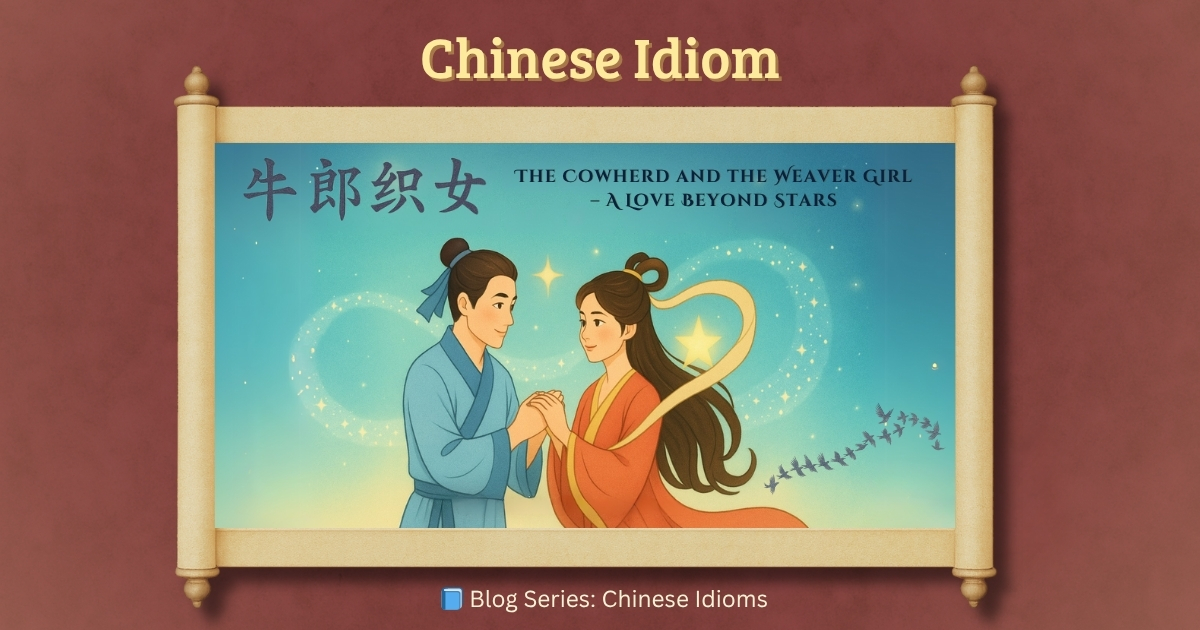🌌 牛郎织女 niú láng zhī nǚ – The Cowherd and the Weaver Girl

🔍 What It Means
牛郎织女 (niú láng zhī nǚ) literally means “The Cowherd and the Weaver Girl.”
This idiom tells the story of two lovers — a mortal and a goddess — who can only meet once a year, on the seventh day of the seventh lunar month. It’s a symbol of longing, true love, and sad separation.
📖 Word-for-word:
- 牛 (niú) – ox
- 郎 (láng) – young man (often means “husband” or “man”)
- 织 (zhī) – to weave
- 女 (nǚ) – woman
❤️ In English, it’s like:
- 🌠 “Star-crossed lovers”
- 💌 “True love knows no distance”
- 👫 “Together even when apart”
🏺 Where It Comes From
The idiom 牛郎织女 (Niú Láng Zhī Nǚ) — the Cowherd and the Weaver Girl — comes from one of China’s most famous love legends.
Long ago, in the heavens above,
Lived Zhī Nǚ — the Weaver Girl — who wove clouds with grace and love.
She was a fairy, the granddaughter of the Jade Emperor,
But her heart longed for more than duty and sky.
One day, she slipped down to earth…
There she met Niú Láng, a gentle cowherd with kind eyes and a loyal old ox.
In the quiet fields, they fell in love.
They married, had two children, and lived a simple, happy life.
But their joy angered the heavens.
The Jade Emperor sent guards to take Zhī Nǚ back to the sky.
Niú Láng’s heart broke.
He wanted to chase after her — but how?
The old ox, full of love, offered his help.
He took off his horns,
And they turned into a flying boat,
Lifting Niú Láng and his children into the clouds.
Just as he neared Zhī Nǚ,
The Queen Mother drew a silver river in the sky —
The Milky Way — to keep them apart.
Their love touched the magpies.
Every year, on the 7th day of the 7th lunar month,
Magpies form a bridge, just for one night,
So the lovers can meet once again.
Their story lives on in the stars —
A love so strong, even the sky could not stop it.
💬 How to Use It
Use 牛郎织女 when talking about:
- Lovers who are far apart
- Long-distance relationships
- Deep emotional connection despite separation
✅ Often used in romantic, poetic, or emotional contexts
🚫 Not used for casual friendship or ordinary travel
🎯 Real Examples
1. 他们像牛郎织女,每年只能见一次。
(Tāmen xiàng niú láng zhī nǚ, měi nián zhǐ néng jiàn yí cì.)
👉🏼 They’re like the Cowherd and the Weaver Girl — they can only meet once a year.
2. 这段牛郎织女般的爱情打动了很多人。
(Zhè duàn niú láng zhī nǚ bān de ài qíng dǎ dòng le hěn duō rén.)
👉🏼 This Cowherd-and-Weaver-Girl kind of love touched many people.
⚠️ Common Mistakes (Watch Out!)
❌ Mistake: Using 牛郎织女 for casual long-distance friends.
✅ Correct: It’s for lovers, and it’s poetic — not for everyday use.
💡 Memory Tip

Imagine the bright stars above the night sky…
Once a year, magpies form a bridge in the heavens so they can meet.
That’s 牛郎织女 — a story of love that even the stars honor.
🧩 Interactive Practice
Translate this sentence into English:
- 他们就像牛郎织女,被命运分开,却一直相爱。
- Tāmen jiù xiàng niú láng zhī nǚ, bèi mìng yùn fēn kāi, què yì zhí xiāng ài.
Answer:
They’re like the Cowherd and the Weaver Girl — separated by fate, but always in love.
🌟 Final Thoughts
牛郎织女 reminds us that true love can last — even across time and distance.
🌌 Love is strong, even when separated.
Ask yourself:
Is there someone you always keep in your heart, no matter how far?
🌙 One story ends, but many more await…
📚 Step into the world of timeless Chinese idioms!
Thank you for subscribing!
Have a great day!